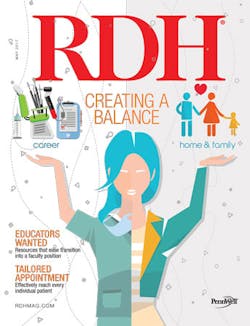Dental study points out reduced risks for aspiration pneumonia through more dental care
By NOEL BRANDON KELSCH, RDH, RDHAP, MS
Lynn, my patient, proudly stated that she had not been to the dentist in seven years. She said she was just coming in because her pulmonologist insisted that she get a dental checkup. “Dentists and hygienists just want you to come in so they can buy a new car,” Lynn said. I laughed. Our dentist was driving an old Volkswagen he inherited from his son when he left for college.
As I read through Lynn’s health history and learned she had been in the hospital with pneumonia twice this year, I realized her pulmonologist might be more on target than he even realized. A new study has confirmed the need for regular dental care in the prevention of pneumonia.
The Centers for Disease Control and Prevention reports that 50,622 people died of pneumonia in the United States in 2015. Pneumonia impacted the lives of almost a million people last year.1 Even with the advent of antibiotic therapy, the mortality rate since the 1950s has not improved that much with regard to pneumonia.
It has long been known that keeping the mouth clean by brushing and interdental cleaning can make a difference in the rate of aspiration pneumonia.2,3,4 A recent study has shown the probability that it is not only necessary to have a clean mouth, but it is also crucial to have regular dental care. The study suggests that lack of access to dental services may correspond to an increased risk of aspiration pneumonia.5
What is pneumonia?
According to the National Institutes of Health, “pneumonia is a bacterial, viral, or fungal infection of one or both sides of the lungs that causes the air sacs, or alveoli, of the lungs to fill up with fluid or pus. Symptoms can be mild or severe and may include a cough with phlegm (a slimy substance), fever, chills, and trouble breathing.” Several things play into this disease:
- Type of germ causing the lung infection
- Age of the patient
- Overall health of the patient
- We do know that pneumonia tends to be more serious for children under age five and adults over age 65. Further, if you have specific conditions, you increase both the incidence rate and severity of the disease. These specific conditions include, but are not limited to:
- Heart failure
- Diabetes
- Chronic obstructive pulmonary disease
- Weak immune system
- Chemotherapy (a treatment for cancer)
Aspiration of oral pathogens (including bacteria, viruses, and fungi) into the respiratory tract of patients who are susceptible can lead to pneumonia.6
Oral health care and pneumonia
A survey that evaluated national health-care utilization and access to dental care also studied the relationship to pneumonia.7 This information was compiled from a 2013 survey of more than 26,000 patients. A diagnosis of bacterial pneumonia was analyzed for association with various covariates. The researchers found that 441 of 26,246 people in the database had bacterial pneumonia (1.68%).
The most striking finding was that the variable frequency of dental checkups was significantly associated with pneumonia. This new research revealed that people who never get dental checkups have an incredible 86% greater risk of pneumonia than those who visit their dentist twice a year!
The study went on to state that the risk of pneumonia appears to decrease in those who have routine dental checkups. This data is consistent with previous studies that show oral health as an important component of overall health.8 Interestingly, dental insurance did not appear to play a major role or be associated with the incidence rate of pneumonia. As such, the study’s findings show that insurance alone may be insufficient to guarantee access to dental care.
This study confirms the need to educate patients on the importance of maintaining oral health between visits, as well as help them understand the real reason behind the recommendation for frequent dental visits. RDH
NOEL BRANDON KELSCH, RDH, RDHAP, MS, is a syndicated columnist, writer, speaker, and cartoonist. She serves on the editorial review committee for the Organization for Safety, Asepsis and Prevention newsletter and has received many national awards. Kelsch owns her dental hygiene practice that focuses on access to care for all and helps facilitate the Simi Valley Free Dental Clinic. She has devoted much of her 35 years in dentistry to educating people about the devastating effects of methamphetamines and drug use. She is a past president of the California Dental Hygienists’ Association.
References
1. Pneumonia. National Center for Health Statistics. Centers for Disease Control and Prevention. https://www.cdc.gov/nchs/fastats/pneumonia.htm. Updated October 6, 2016. Accessed March 17, 2017.
2. Scannapieco FA, Bush RB, Paju S. Associations between periodontal disease and risk for nosocomial bacterial pneumonia and chronic obstructive pulmonary disease. A systematic review. Ann Periodontol. 2003;8(1):54-69.
3. Limeback H. Implications of oral infections on systemic diseases in the institutionalized elderly with a special focus on pneumonia. Ann Periodontol. 1998;3(1):262-275.
4. Russell SL, Boylan RJ, Kaslick RS, Scannapieco FA, Katz RV. Respiratory pathogen colonization of the dental plaque of institutionalized elders. Spec Care Dent. 1999;19(3):128-134.
5. Doll M, Kelly K, Ratliff S, Carroll N. Access to Dental Care and Risk of Pneumonia: The Importance of Healthy Teeth. Poster Abstract Session: They’ve Been Here a Billion Years! Pediatric Bacterial and Viral Infections. New Orleans, LA: IDWeek 2016. https://idsa.confex.com/idsa/2016/webprogram/Paper58758.html. Presented October 27, 2016. Accessed March 17, 2017.
6. https://www.nhlbi.nih.gov/health/health-topics/topics/pnu
7. US Department of Health and Human Services. Oral Health in America: A Report of the Surgeon General-- Executive Summary. Rockville, MD: US Department of Health and Human Services, National Institute of Dental and Craniofacial Research, National Institutes of Health, 2000. http://www.nashp.org/links-oral-overall-health/
8. Doll M, Kelly K, Ratliff S, Carroll NV. Poster from conference: Access to Dental Care and Risk of Pneumonia: The Importance of Healthy Teeth. http://www.idsociety.org/Press_Release_10_27_2016_2/, https://idsa.confex.com/idsa/2016/webprogram/Paper58758.html, accessed March 1, 2017.
